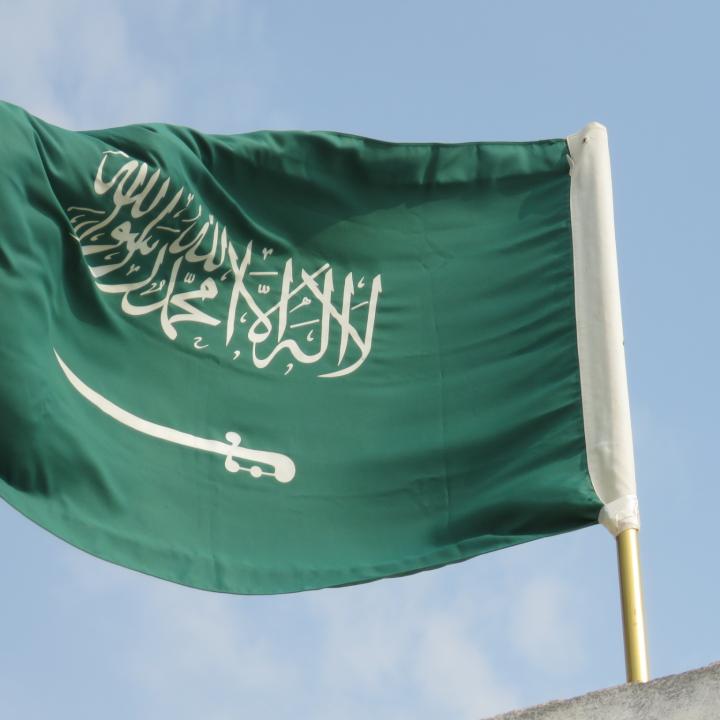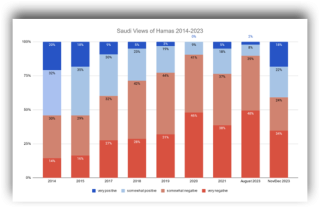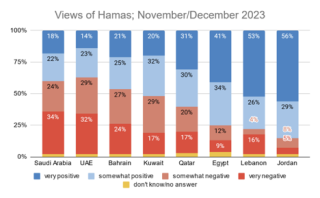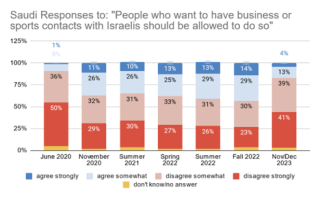
- Policy Analysis
- Fikra Forum
New Poll Sheds Light on Saudi Views of Israel-Hamas War

Positive views of Hamas receive a jump while remaining the minority opinion among Saudi citizens; most agree that Israel is “weak and divided.”
A Washington Institute poll conducted from November 14 to December 6, a nationally representative sample of 1,000 Saudi citizens measured how Saudi attitudes have shifted due to the Israel-Hamas war. According to responses, the Saudi popular attitude towards the outcome of the war is clear: the overwhelming majority (91%) express agreement with the statement that “despite the destruction and loss of life, this war in Gaza is a win for the Palestinians, Arabs, and Muslims.” And as for the role of the broader Arab world, almost all (96%) agree with the proposal that “Arab countries should immediately break all diplomatic, political, economic, and any other contacts with Israel, in protest against its military action in Gaza.”
Polling during a war is likely to produce more volatile results as circumstances shift quickly on the ground—during the current polling period, for instance, the Israel-Hamas war had several major shifts, including a temporary ceasefire from November 24-30 and the subsequent expansion of Israel’s incursions into southern Gaza. However, comparisons with Saudi polling fielded in August can help provide a barometer as to just how sharply this conflict has, at least temporarily, shifted certain attitudes, and how little it has moved others.
While Hamas as a movement remains unpopular among the majority of Saudis—in contrast to a new trend of widespread popular support in countries like Lebanon, Jordan, and Egypt—just 16% of Saudis say that “Hamas should stop calling for the destruction of Israel, and instead accept a permanent two-state solution to the conflict based on the 1967 borders.”
Nor do most believe that Hamas’s attack on October 7 targeted Israeli civilians—the overwhelming majority of Saudis (95%) responded that Hamas did not actually kill civilians when asked about whether they believed the Hamas killing of civilians was against Islam. This view is widespread across the eight countries polled by TWI, and similar results appear in a recently released poll of Palestinians from PSR. There, the overwhelming majority reported that they had not seen any videos of Hamas members committing atrocities, and only 10% of Palestinians (17% of Gazans and 5% of West Bankers) stated that they believed that Hamas committed war crimes in the current war, in comparison to 95% who say the same about Israel.
While the majority of Saudis continue to express a negative opinion of Hamas, the Israel-Hamas war has generated a significant boost in its popularity. There has been a thirty point shift in positive attitudes towards Hamas, from just 10% in August to 40% in November/December. Responses in the most recent poll, alongside those in 2014 and 2021, demonstrate the increased popularity Hamas achieves among some Saudis during or in the immediate aftermath of conflict between Hamas and Israel, along with its likely disappearance over time. In the aftermath of the 2021 Hamas-Israel conflict, for instance, five years of steadily decreasing popularity in Saudi Arabia suddenly reversed, though just to a quarter (23%) of the total population.
Yet in contrast to countries like Lebanon, Jordan, and Egypt—where Hamas has a majority and in several cases unprecedented level of approval since 2014—Hamas remains less popular among Saudis than when polled after the 2014 conflict.
For its part, Israel had very little sympathy to lose among Saudis prior to the war. Now, 87% agree with the suggestion that “recent events show that Israel is so weak and internally divided that it can be defeated some day.” For most, this perception likely existed prior to the war as well—70% agreed to a similar suggestion that the widespread 2023 protest movement against Netanyahu reflected a “weak and divided country.”
When Saudis were asked in August whether they agreed with the proposal that “We should show more respect to the world’s Jews, and improve our relations with them,” just 5% agreed. This is much the same from when the question was posed in 2021, and stands in marked contrast to attitudes on a similar 2021 question about Christians, where Saudi attitudes were split. Moreover, questions on attitudes towards contacts with Israelis or Jews that expanded beyond the realm of economic cooperation had little to no popular traction prior to the war.
The one area where a significant minority had previously expressed interest—or at least acquiescence—was in allowing economic ties. The Israel-Hamas war has significantly suppressed support for allowing business contacts with Israelis. While still higher than the levels prior to the Abraham Accords, after years of incremental increase from 37% from 2020 to 43% in November 2022, agreement with such a statement has now shrunk to 17%.
In contrast, support for Arab peace initiatives that by necessity involve Israel remains. Three quarters express support for Arab diplomatic involvement in “Palestinian-Israeli peacemaking, offering both sides incentives to take more moderate positions” (75%), and all the more so to provide humanitarian support to Gazans. Moreover, when posed with the suggestion “Regardless of what’s right, there’s no military solution to the conflict with Israel, so there will have to be political negotiations for a Palestinian-Israeli agreement some day,” an even larger majority (86%) agree. Similarly, there is little appetite for direct military involvement—88% agree that ‘Right now, internal political and economic reform is more important for our country than any foreign policy issue, so we should stay out of foreign wars,” a statistically equivalent percentage to when last asked in fall 2021.
The war has also done little to change Saudi perceptions of other adjacent actors in the conflict. For instance, about 90% of Saudis express a negative view of Hezbollah—a proportion that has not shifted in a number of years. Likewise, 81% agree that “Events of the past few weeks show that Iran, Hezbollah, the Houthis, and their other militia allies are, and for various reasons, reluctant to help the Palestinians.” Attitudes towards the Palestinian Authority have also shifted sharply over the past decade, but have changed little since the war began. Whereas 41% expressed at least a somewhat positive view of the PA in 2014, just 10% do so now, similar to the 15% who said the same in August.
Methodological Note
This analysis is based on findings from a survey commissioned by The Washington Institute and conducted by a highly qualified, experienced, and independent regional commercial survey firm. The survey comprised face-to-face interviews with a representative national sample of 1,000 Saudi citizens, selected according to standard geographic probability procedures. The contractor provided strict quality controls and assurances of confidentiality throughout the fieldwork, coding, and data processing. The theoretical margin of error for a sample of this size and nature is approximately plus or minus three percentage points.







